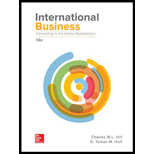
To explain: Whether the given statement is correct.
Given statement:
The strategic option for the multinational company should rely on its comparison with the advantages of the strategy with its costs of implementation. On such basis, it might be logical for few companies to pursue the localization strategy, international or global strategy, and transitional strategy.
Explanation of Solution
The given statement is correct. There exists a cost-benefit trade-off with the choice of strategy. The cost of control and structure for various strategies could change widely. Transnational is often too high, at the same time, the localization is very low.
The localization strategy do not confer numerous benefits of transnational, international, or global strategy. One should not forget that the strategy should fit with the competitive environment of the company, the organizational structure, and the
Want to see more full solutions like this?
Chapter 14 Solutions
International Business: Competing in the Global Marketplace
- What is the correct option? For general accounting question give me step by step explanationarrow_forwardThurman Industries expects to incur overhead costs of $18,000 per month and direct production costs of $155 per unit. The estimated production activity for the upcoming year is 1,800 units. If the company desires to earn a gross profit of $72 per unit, the sales price per unit would be which of the following amounts? A. $327 B. $240 C. $273 D. $347 helparrow_forwardAccounting answerarrow_forward
- A machine has a cost of $18,500, an estimated residual value of $4,500, and an estimated useful life of five years. The machine is being depreciated on a straight-line basis. At the end of the second year, what amount will be reported for accumulated depreciation?arrow_forwardWhat will be it's net operating incomearrow_forwardNonearrow_forward
 Contemporary MarketingMarketingISBN:9780357033777Author:Louis E. Boone, David L. KurtzPublisher:Cengage LearningMarketingMarketingISBN:9780357033791Author:Pride, William MPublisher:South Western Educational Publishing
Contemporary MarketingMarketingISBN:9780357033777Author:Louis E. Boone, David L. KurtzPublisher:Cengage LearningMarketingMarketingISBN:9780357033791Author:Pride, William MPublisher:South Western Educational Publishing Foundations of Business (MindTap Course List)MarketingISBN:9781337386920Author:William M. Pride, Robert J. Hughes, Jack R. KapoorPublisher:Cengage Learning
Foundations of Business (MindTap Course List)MarketingISBN:9781337386920Author:William M. Pride, Robert J. Hughes, Jack R. KapoorPublisher:Cengage Learning Foundations of Business - Standalone book (MindTa...MarketingISBN:9781285193946Author:William M. Pride, Robert J. Hughes, Jack R. KapoorPublisher:Cengage Learning
Foundations of Business - Standalone book (MindTa...MarketingISBN:9781285193946Author:William M. Pride, Robert J. Hughes, Jack R. KapoorPublisher:Cengage Learning





